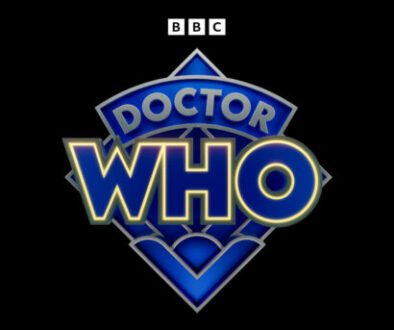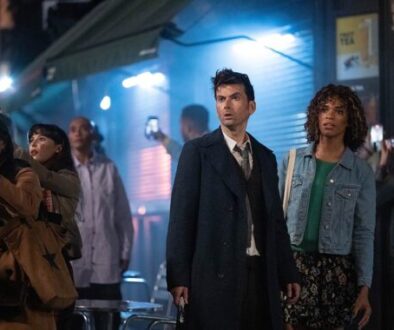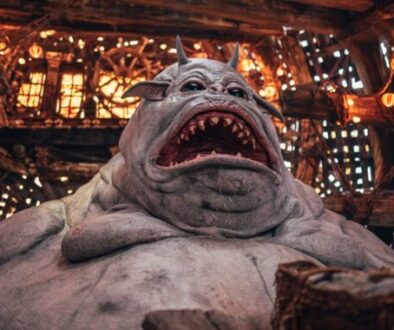Doctor Who – “The Giggle” Review – Where Do You Get Off?
Clint Hassell gives his SPOILER-filled commentary on the third 60th anniversary special.

Note: this review contains full SPOILERS for the third 60th anniversary special.
What is “The Giggle”? Is it a 60th anniversary special? A regeneration episode? A reunion? A setup for a spin-off? A farewell to an accomplished actor? The end of a story arc? The start of a new era? “The Giggle” tries to be all these things, resulting in a disjointed narrative that fails to deliver on the inherent spectacle of its premise.
Part of the problem is that too much is crammed into the episode’s script. There’s the obligatory references to Doctor Who’s 60 years of canon, with the events of The Trial of a Time Lord, The Key to Time, and Logopolis; the deaths of companions Adric and Sarah Jane; and the fates of Amy, Clara, Bill, River Song, and Rose all being mentioned, along with the Archangel Network, the Time War, the Pandorica, and more. The 50th anniversary special itself gets a meta reference, with UNIT again dangling the TARDIS from a helicopter. The episode is rife with social commentary about the pervasiveness of the Internet and the maddening effect of TV on humanity. Future plot threads are established, including the ominous “One Who Waits,” the return of the Master (a mere three episodes after his last appearance, mind you), and a UNIT spin-off. Even “real” history—here, John Logie Baird’s use of the head of a ventriloquist’s dummy in testing his newly-developed television—is featured; though, unlike most “historical” episodes of Doctor Who, the event barely plays into the plot. The episode’s script involves too many elements, and it does not allot enough time for any of its casual references to resonate with the audience.
Regrettably, this removes all character development from the supporting cast, which are critically underserved. What is the Vlinx and why is UNIT now housed in Avengers Tower? Why is Kate Lethbridge-Stewart uncharacteristically overwhelmed and panicked? What happened to her steely resolve? Why is Shirley Anne Bingham here, other than to establish her as a recurring character for the inevitable UNIT spin-off? Where has returning icon Trinity Wells been since The End of Time? The narrative doesn’t have time to answer any of these questions. Note that Donna Noble—whose humanity was pivotal to the plot of “Wild Blue Yonder”—features in this episode as someone who . . . types really fast. While one could argue that Donna’s story arc is resolved in “The Star Beast,” it is a shame that “The Giggle” does little more than feature this fan-favorite character in a stock companion role.

Why was Mel in this episode? She doesn’t receive enough screen time to celebrate her tenure as a classic-era companion, and she isn’t developed enough to endear her to modern-era viewers. Each of Mel’s actions could be performed by Kate or Shirley or Donna—all of whom lack agency within the narrative. Mel just . . . appears (again, a mere three episodes after her last appearance). Imagine if showrunner Russell T Davies had held Mel for Series 14, with Ncuti Gatwa’s Doctor. Davies could’ve played against the expectations he set in “School Reunion” by featuring a positive interaction between new companion Ruby Sunday and former companion Mel. Perhaps, instead of clinging to the false hope of traveling in the TARDIS forever, Ruby could learn to savor the limited time she has with the Doctor, preparing herself for its inevitable end and her return to “normal” life.

With so many extraneous characters and concepts, the plot has little time to develop. How is the image of Stooky Bill and the Toymaker’s giggle stuck inside every TV and human brain? Who is the Toymaker, beyond being a Mxyzptlkian, reality-warping imp? What does it mean to be “an elemental force beyond the rules of the Universe”? The episode doesn’t answer this question, with Shirley Bingham even asking, “What’s that supposed to mean?” The presence of the Toymaker, a villain whose god-like powers are magical, skews the narrative too far into fantasy. Where narratives in science fiction—including Doctor Who—may be implausible, they are theoretically possible through scientific or technological advancement. There is less suspension of disbelief required, because an explanation is given, and the narrative is able to focus on commenting on the human experience. In contrast, fantasy uses magic as a main plot point, which requires a greater suspension of disbelief, and often focuses on archetypes-as-characters, such as the Toymaker. Some of Doctor Who’s most infamous episodes have skirted fantasy by using nigh-magical monsters with reality warping powers. However, where “Fear Her” and “Night Terrors” explored complicated relationships with father figures, and “Kill the Moon” featured a character-defining monologue from a furious Clara, and “In the Forest of the Night” had . . . actually, I’m not sure what “In the Forest of the Night” had—“The Giggle” merely uses elements of fantasy as shorthand. The episode is too stuffed to offer more of an explanation than “elemental force beyond the rules of the Universe,” i.e., magic.
Perhaps Davies’ use of fantasy narrative elements is purposeful, as it ties into the special’s epilogue which, like any good fairy tale, gives the hero his happily-ever-after ending. Except that it’s neither “happy” nor “ever after.” Donna posits that she is an expert on living a normal life, because she “stayed in one place and lived day after day,” once she left the TARDIS. But, she didn’t leave willfully, and she stayed in one place because she didn’t remember that she had any other option, that she was once special beyond measure. Further, the subconscious loss of that sense of adventure made her miserable! The Doctor can still remember the call of “all of time and space,” so how much worse would settling down be for him? Have we so quickly forgotten “The Power of Three”? “The Giggle” even admits that retirement is a dismal fate for the Fourteenth Doctor, as Donna looks at him pityingly and says, “You don’t have to stay forever.”

So, why the bi-generation? Why does Davies not let Fourteen go? Notably, Davies has written many excellent “jumping on” points—episodes like “Rose,” “Smith and Jones,” and “Everything Changes”—that serve to introduce new viewers to the mythology of the Whoniverse. “The Giggle” is the opposite: a “jumping off” point. Davies explains it best, as the Toymaker rants to the Doctor about present society, lamenting, “They shout, they type, and they cancel.” And is he wrong? Since fan-favorite David Tennant left the role, every successive Doctor has been “too young,” “too old,” “too female,” “too pre-Hartnell.” The prevalence of culture wars and intolerance has created a toxic side to fandom.
Thus, “The Giggle” and bi-generation, which allows viewers who refuse to see Davies’ new, non-traditional take on the titular Time Lord as “their Doctor” a chance to “get off the narrative train,” so to speak. Just as former showrunner Steven Moffat re-imagined the Fourth Doctor living out his golden years as the Curator, in the 50th anniversary special, Davies leaves Tennant’s Doctor with his best companion, and a family with whom he can still take quick jaunts to Mars. He even has his own TARDIS! That Doctor is still alive and can live in everyone’s head canon forever, having adventures with Wilf and Donna and Rose, just off-screen, while the series itself focuses solely on the newest incarnation of the Doctor.
Random Musings








(Time) Capsule Review
Too overstuffed with references to canon to give fan-favorite actor David Tennant and beloved companion Donna Noble a good send-off, the script for “The Giggle” also suffers from utilizing elements of fantasy narratives. Perhaps this is intentional, as the Fourteenth Doctor ostensibly gets his fairy tale “happy ending.” Russell T Davies’ script is an excellent “jumping off” point for fans uninterested in following the adventures of the Fifteenth Doctor.
If you’d like to interact with the author of this article, follow him on Twitter @ClintHassell.








